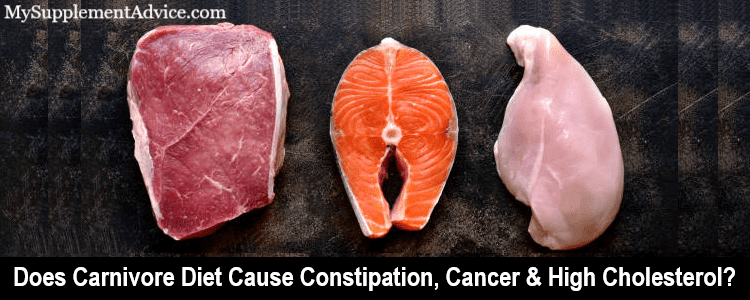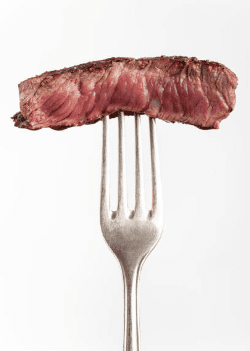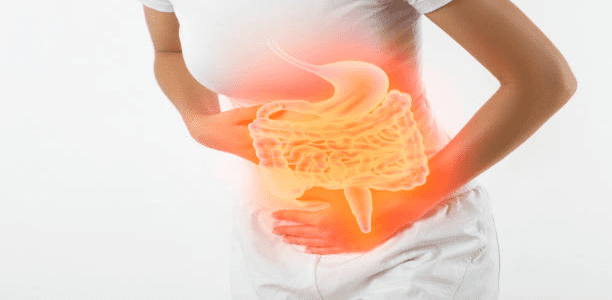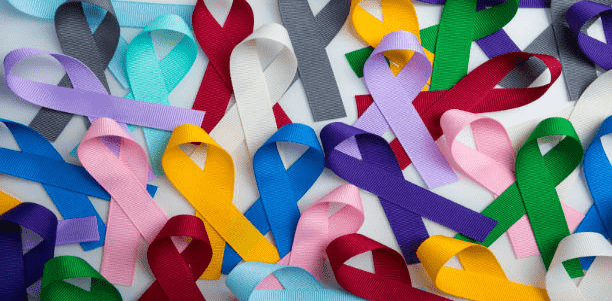
Does Carnivore Diet cause constipation, cancer & high cholesterol?
Is it really safe for weight loss?
Well, let's see the connection between them in this article.
Also – we're going to discuss some helpful details:
- top causes behind
- most common symptoms and signs
So if you want to find out the truth about this diet, you're in the right place.
Note: This article includes references and studies on Carnivore Diet and its risks.
In A Nutshell
At this point, we already talked about the Carnivore Diet in detail.
But now, we're going to focus specifically on its major side effects:
- cancer
- constipation
- high cholesterol levels
Now – this dietary pattern can potentially increase the risk for the conditions above.
There are many reasons why it's not the most ideal type of diet:
- not nutritionally adequate
- does not include other nutrient-dense food groups
- high in fat, moderate in protein and very low in carbohydrates foods
- increases the risk of gut imbalance
- restrictive and quite hard to follow for long term
- raises the risks of health-related issues
If you consider all the points above, the Carnivore Diet far from healthy.
Although it might be very effective for weight loss, it's not worth trying.
Again – there are safer ways to lose weight or to improve your other health conditions.
Lastly, you need to remember that a person's health needs are different.
So the Carnivore Diet is not a one size fits all regimen.
If you absolutely want to give it a try, it's better to seek medical help before.
But its lack of current research and studies about it is another sign that it's not really recommended.
Is Carnivore Diet Really Dangerous?
I want to say right away the Carnivore Diet is not free from side effects.
Again – it's a dietary approach that only involves consuming animal products.
To be exact, the only allowed foods are listed below [1] :
- red meats
- poultry
- organs
- dairy products
- whole eggs
- bone broth
- fish and seafood
Other foods are no longer permitted in the diet (especially plant-based foods).
Now, one of the main issues about this dietary pattern is that it doesn't provide all the essential nutrients.
If you lack the necessary nutrients, your body will not be able to function properly.
Over time, this can lead to nutrient deficiencies that can turn into long-term complications.
Also – foods high in fat, moderate in protein and very low in carbohydrates are not healthy:
- can increase the risk of stroke or heart disease
- also lead to other chronic conditions
So if you consider those reasons, the Carnivore Diet is not really sustainable in the long run.
But does it really cause constipation, cancer and high cholesterol?
Well – let's talk about each of them down below.
Carnivore Diet & Constipation
Firstly – let's define what constipation means.
Basically, it's a condition where there's an infrequent passage of stools [2].
In other words, people find it hard to release their stools.
So let's quickly list down the common signs and symptoms of constipation [3]:
- abdominal bloating
- stomach pain or cramps
- decreased appetite
- lethargy or inactivity
- hard stools and anorectal blockage
Now – let's talk about some possible reasons why the Carnivore Diet causes this problem:
- your body might find it hard to produce digestive enzymes if you eat excess protein [4]
- lack of fiber can contribute to the difficulty of the stools to pass through [5]
- electrolytes imbalance (due to low amounts of minerals) affects smooth gut muscle contractions [6]
- gut dysbiosis due to a lack of prebiotics (most of them come from eliminated foods in this diet) [7]
- animal products tend to take longer to digest [8]
If we narrow it down, not eating nutritional food groups will definitely affect your digestive functions.
In addition – fiber is important in the diet since it helps your body flush out stools.
It works by adding bulk to the stool and making it easier to pass [9].
Also – fiber is essential to support the growth of healthy gut bacteria (works as prebiotics) [10].
Although water can help soften the stool [11], it might not be enough for some people.
Lastly, fiber comes from whole grains, nuts, vegetables, fruits and beans.
So removing them from your diet will make you more prone to constipation [12].
Overall – everyone's digestive system is different.
Some people will feel normal while following the Carnivore Diet.
However – it's generally recommended to include fiber-rich foods in your diet.
Carnivore Diet & Cancer
Now – cancer is a disease that describes the uncontrollable division of abnormal cells [13].
These cells are called cancer cells and they can invade nearby tissues.
Also – they can spread through the blood and lymph systems to the other parts of the body.
Well – I mentioned in the previous article that it's one of the side effects of the Carnivore Diet.
But let me describe again how this dietary approach can possibly cause cancer:
- cooking meat in high temperatures can produce carcinogens [14]
- high saturated fats can increase inflammation, obesity, diabetes and oxidative stress [15] [16]
- lack of fruits and vegetables deprives the body of antioxidants and phytochemicals [17]
- inadequate intake of fiber can worsen digestive issues (increases the risk of gut-related cancer) [18]
- limited source of protective nutrients that have anti-cancer properties
- imbalances in the gut bacteria could affect immune functions [19]
Now – there are several factors that trigger the development of cancer.
Some include genetics, carcinogens, lifestyle choices, viral infections and chronic inflammation.
But in the case of the Carnivore Diet, cancer will most likely come from carcinogens.
So let me give you common examples of the compounds involved in this [20]:
- heterocyclic amines (HCAs)
- polycyclic aromatic hydrocarbons (PAHs)
Again – these types of substances can damage the DNA and alter cellular metabolism [21].
Also, the heme iron from red meats can accelerate the production of carcinogens.
As you can see, you don't get them directly from the foods you eat.
Instead, they come from the way you cook the meat, which is a factor.
So to give you an idea, here are the organs that are prone to cancer with this type of dietary regimen [22]:
- colorectal
- pancreatic
- stomach
- prostate
- lung
As of the moment, there's no direct evidence that the Carnivore Diet causes cancer.
However – if you align your lifestyle with it, the risk of getting the disease may increase.
So if you want to live a healthy life, start by following a sustainable diet.
But unfortunately – the Carnivore Diet is not considered a balanced one.
Carnivore Diet & Cholesterol
As I mentioned before, the Carnivore Diet comes with a restrictive approach.
Although it's not as strict as its other diet types, it's still not a balanced one.
Now – not all types of cholesterol are awful.
The low-density of lipoprotein (LDL) is considered bad, while high-density of lipoprotein (HDL) is good [23].
With that, here's how the diet can potentially affect your cholesterol levels:
- saturated fats can raise the level of LDL, which is a risk factor for chronic diseases [24]
- lacks beneficial nutrients that could normalize cholesterol levels
- high protein intake from animal products may stimulate the liver to produce more LDL cholesterol [25]
- imbalanced consumption of fatty acids can also affect cholesterol levels [26]
- the diet can also increase inflammation
- inadequate fiber intake might affect the way your body maintains healthy cholesterol levels [27]
Now – there are no specific symptoms of a high cholesterol [28].
In fact, some people might not even know that they have it until they get their blood tested.
However – there are some signs that you need to take note of:
- chest pain or angina
- shortness of breath
- weakness in your arms/legs
- tingling sensation or nerve damage
- dizziness or headaches
- memory problems
- xanthelasma or arcus senilis
Again – the Carnivore Diet has different effects on people who tried it.
Some truly experienced the benefits, while others did not.
In terms of cholesterol levels, it's quite obvious that a mix of fats and carbohydrates influences it [29].
So if you really consider the food groups allowed in this diet, the amount of protein and fats are not ideal.
With that, this dietary pattern raises concerns about its long-term health effects.
So you should be mindful of the food you eat on a daily basis.
It's still better to stick with a balanced diet.
Is Carnivore Diet Recommended?
As of the moment, there are still a lot of debates regarding the Carnivore Diet's influence on overall health.
Again – some people claimed that it helped them, especially in terms of weight loss.
However, there are very limited studies to prove its efficacy and safety [30].
So in reality, it's not widely endorsed by experts.
With that, here are again the reasons why it's not recommended:
- nutritionally inadequate
- eliminates important sources of nutrients
- high intake of animal products
- increases the risks of several health problems
- negatively impacts gut health
- difficult and restrictive to sustain
- raises ethical concerns about animal welfare
Again – any type of dietary change should be taken with caution.
In that way, you will avoid unwanted consequences that might deteriorate your health.
So if you really want to try a new diet, it's best to seek advice from a qualified healthcare professional.
The basic thing you should remember is that a balanced diet is very important.
But that's not the case for the Carnivore Diet (just so you know).
Final Conclusion
In reality – the Carnivore Diet is not as healthy as it seems.

- constipation
- cancer
- cholesterol levels
Again – there are several factors that can cause the health conditions above.
But this type of dietary pattern can also contribute to the risk.
The major reason is that you need to basically avoid other nutrient-dense food groups.
Although the foods allowed in this diet are still nutritious in some ways, they are still not enough.
In addition, most of the feedback about the Carnivore Diet is related to weight loss.
Honestly – you can lose weight through healthier alternatives.
Overall, you should consult a medical professional before trying the diet (if you absolutely want to try it).
References:
1 – https://www.thecarnivoredietcoach.com/-carnivore-foods/
2 – https://www.ncbi.nlm.nih.gov/-pmc/articles/-PMC6140151/
3 – https://www.ucsfhealth.org/conditions/constipation/-symptoms/
4 – https://journals.physiology.org/doi/full/10.1152/-ajpgi.00319.2017/
5 – https://www.ncbi.nlm.nih.gov/-pmc/articles/-PMC3544045/
6 – https://www.frontiersin.org/articles/10.3389/-fphar.2021.630249/
7 – https://www.ncbi.nlm.nih.gov/-pmc/articles/-PMC6379309/
8 – https://pubmed.ncbi.nlm.nih.gov/-30209430/
9 – https://www.hsph.harvard.edu/nutritionsource/carbohydrates/-fiber/
10 – https://www.ncbi.nlm.nih.gov/-pmc/articles/-PMC8624670/
11 – https://www.mdpi.com/2072-6643/13/10/-3386/
12 – https://www.niddk.nih.gov/health-information/digestive-diseases/-constipation/
13 – https://www.cancer.gov/about-cancer/understanding/-cancer/
14 – https://www.cuimc.columbia.edu/news/–grilled-foods-cancer/
15 – https://www.ncbi.nlm.nih.gov/-pmc/articles/-PMC6893649/
16 – https://www.ncbi.nlm.nih.gov/-pmc/articles/-PMC7857849/
17 – https://academic.oup.com/ajcn/article/78/3/517S/-4689990/
18 – https://www.betterhealth.vic.gov.au/health/healthyliving/-fibre-in-food/
19 – https://www.ncbi.nlm.nih.gov/-pmc/articles/-PMC3337124/
20 – https://www.cancer.gov/about-cancer/risk/diet/-cooked-meats/
21 – https://www.ncbi.nlm.nih.gov/-pmc/articles/-PMC6195640/
22 – https://www.keckmedicine.org/-good-and-bad-cholesterol/
23 – https://www.heart.org/en/healthy-living/healthy-eating/-saturated-fats/
24 – https://www.who.int/news-room/-cancer-carcinogenicity/
25 – https://www.health.harvard.edu/-cholesterol-levels/
26 – https://www.ncbi.nlm.nih.gov/-pmc/articles/-PMC2943062/
27 – https://www.hsph.harvard.edu/nutritionsource/carbohydrates/-fiber/
28 – https://www.cedars-sinai.org/health-library/-high-cholesterol/
29 – https://www.hsph.harvard.edu/fats-and-cholesterol/-cholesterol/
30 – https://www.ncbi.nlm.nih.gov/-pmc/articles/-PMC3253466/










